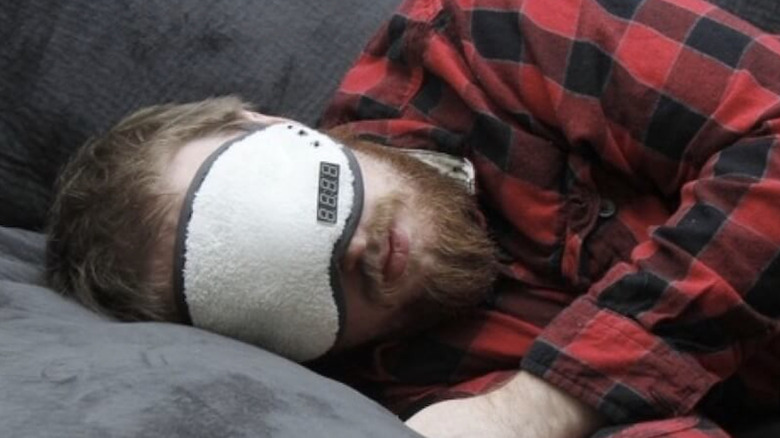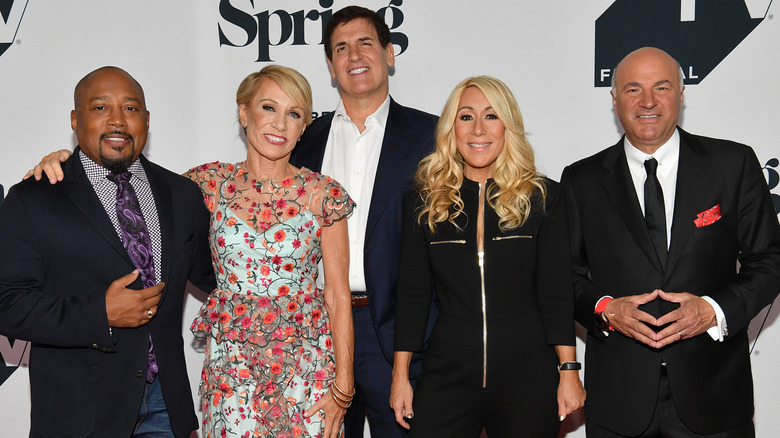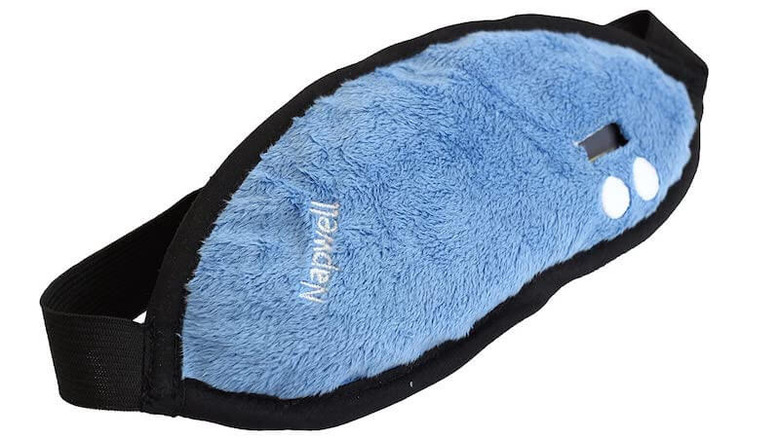Where Is Napwell Alarm Clock Mask From Shark Tank Season 6 Today?
Back in the early days of "Shark Tank," entrepreneurs Neil Joglekar and Justin Lee took the stage during Season 6 in a pair of matching onesie pajamas to pitch their sleep-mask product Napwell to the Sharks (via ABC). While the device initially appeared much like any other cozy sleep mask you might purchase at a department store, Joglekar and Lee explained that Napwell was designed with a special alarm-clock feature to gently transition users from sleep to wakefulness. This feature, however, didn't involve a jarring buzzing sound like so many of us are used to. Instead, the mask used built-in LED lights and a timer to slowly wake you over the course of ten minutes, much like you would respond to the natural light of the rising sun.
When it came to start-ups, this wasn't Joglekar's first rodeo. He was already the founder of a California-based tutoring company as well as a video platform called ReelSurfer (via LinkedIn). At the time, Joglekar was also advising and investing in up-and-coming tech companies. With Lee having earned a Ph.D. in medical engineering and medical physics from MIT (via LinkedIn), the co-founders were more than equipped to make their case.
What happened to Napwell on Shark Tank?
Joglekar and Lee were seeking a $100,000 investment in exchange for a 10% stake in the company (via ABC). They stated that Napwell was the answer to a problem facing 2 out of every 5 Americans: sleep inertia. Referring to these individuals as "sleep zombies," the entrepreneurs explained that many of us struggle to get a sufficient night's sleep which leads to feelings of grogginess the next day as well as headaches from being jolted out of sleep by noisy alarms.
The product was designed to help users "naptomize," the co-founders stated. Almost immediately, however, Joglekar and Lee were met with a lot of pushback from the judges. The entrepreneurs had launched a Kickstarter campaign to work out any early prototype kinks by offering test samples to backers, yet hadn't made any sales (via Gazette Review). The Sharks were wary of the hefty $100 price tag and the lack of outside funding, which the judges found to be suspicious, claiming that Napwell should have been an easy sell for larger tech investors. Ultimately, none of the Sharks took the bait and Napwell walked away unfunded.
What happened to Napwell after Shark Tank?
The entrepreneurs continued to push forward with Napwell even after their time on "Shark Tank" hadn't worked out as planned. During the episode, Daymond John had noted that Napwell wasn't yet ready for "Shark Tank" (via Gazette Review), a sentiment that Joglekar ultimately came to agree with after the fact. "For us, we were probably [in] a bit too early stage for Shark Tank as we are still refining our product and iterating based on customer feedback," the co-founder said to the Boston Business Journal in a 2015 interview. "If we had to do it again, we would probably have spent more time on the vision of the company as opposed to the current iteration of our product."
When asked what the world can expect from Napwell next, Joglekar had told the outlet at the time that they were planning on diving deeper into sleep health by exploring ways to track and measure user sleeping behavior. But did these plans ultimately pan out for the company?
Is Napwell still in business?
Napwell is no longer operating today. According to the company's Kickstarter campaign, Napwell exceeded its $30,000 funding goal by more than $20,000 with the help of over 700 backers. However, the campaign has since closed and has not been updated since 2016. The company experienced significant delays in shipping the product to consumers, many of whom never received their orders, as voiced in the comments.
Those who did receive their orders didn't seem any more satisfied. "I am saddened that the mask turned [out] to be a big disappointment," one customer wrote. "The sloppy detailing, the flimsy materials, the very small display that is impossible to turn off without taking out the battery, the discomfort of having it on my face all add up to conclude that this was a bad investment." Additionally, the link to their website is no longer active and their X account seems to have been abandoned since 2015.
Joglekar and Lee seem to have moved on to bigger and better things. As listed on their LinkedIn profiles, Joglekar is now Google's Group Project Manager and Lee is the Director of Machine Learning and Imaging at PathAI.




